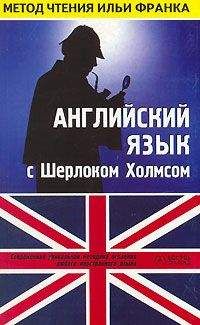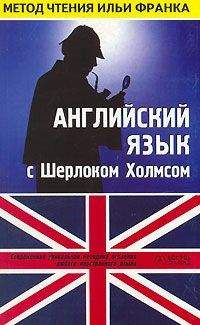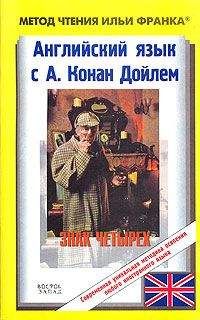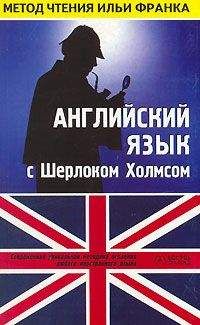“Mr. Blessington seemed more excited over the matter (казалось, мистер Блессингтон был больше взволнован этим делом) than I should have thought possible (чем я счел бы возможным = чем можно было бы ожидать), though of course it was enough to disturb anybody’s peace of mind (хотя, конечно, этого было достаточно, чтобы нарушить душевный покой кого угодно). He actually sat crying in an arm-chair (он просто сел в кресло, плача), and I could hardly get him to speak coherently (и я едва смог заставить его говорить связно = у меня не получалось добиться от него связной речи; coherent — сцепленный, связанный; связный). It was his suggestion that I should come round to you (это было его предложение = это он предложил обратиться к вам), and of course I at once saw the propriety of it (и, конечно, я сразу же согласился: «увидел уместность этого»), for certainly the incident is a very singular one (потому что это происшествие действительно странное), though he appears to completely overtake its importance (хотя, как мне кажется, мистер Блессингтон сильно преувеличивает его значение; to overtake — обгонять). If you would only come back with me in my brougham (если только вы вернетесь со мной в экипаже), you would at least be able to soothe him (вы, по крайней мере, сможете успокоить его), though I can hardly hope that you will be able to explain this remarkable occurrence (хотя вряд ли можно надеяться, что вы сумеете объяснить это удивительное происшествие).”
ascended [@'sendId], propriety [ [email protected]' [email protected]], though [ [email protected]], soothe [su:D]
“They were certainly very much larger than any which he could have made, and were evidently quite fresh. It rained hard this afternoon, as you know, and my patients were the only people who called. It must have been the case, then, that the man in the waiting‑room had, for some unknown reason, while I was busy with the other, ascended to the room of my resident patient. Nothing has been touched or taken, but there were the footprints to prove that the intrusion was an undoubted fact.
“Mr. Blessington seemed more excited over the matter than I should have thought possible, though of course it was enough to disturb anybody’s peace of mind. He actually sat crying in an arm-chair, and I could hardly get him to speak coherently. It was his suggestion that I should come round to you, and of course I at once saw the propriety of it, for certainly the incident is a very singular one, though he appears to completely overtake its importance. If you would only come back with me in my brougham, you would at least be able to soothe him, though I can hardly hope that you will be able to explain this remarkable occurrence.”
Sherlock Holmes had listened to this long narrative with an intentness (Холмс слушал этот долгий рассказ с напряженным вниманием) which showed me that his interest was keenly aroused (показывавшим мне, что дело кажется ему чрезвычайно интересным: «его интерес был сильно пробужден»). His face was as impassive as ever (его лицо было бесстрастным, как всегда), but his lids had drooped more heavily over his eyes (но веки смыкались сильнее: «спускались/свисали более тяжело на его глаза»), and his smoke had curled up more thickly from his pipe (а дым из трубки клубился гуще) to emphasize each curious episode in the doctor’s tale (отмечая любопытные моменты в рассказе доктора; to emphasize — придавать особое значение; подчеркивать; акцентировать). As our visitor concluded (когда наш гость закончил), Holmes sprang up without a word (Холмс вскочил, ни слова не говоря), handed me my hat (подал мне мою шляпу), picked his own from the table (взял со стола свою), and followed Dr. Trevelyan to the door (и последовал за доктором Тревельяном к двери). Within a quarter of an hour we had been dropped at the door of the physician’s residence in Brook Street (через четверть часа мы вышли у дверей дома врача на Брук-стрит), one of those sombre, flat-faced houses (одного из тех мрачных зданий с невыразительным фасадом) which one associates with a West-End practice (которые ассоциируются с практикующими врачами Уэст-Энда). A small page admitted us (маленький слуга впустил нас), and we began at once to ascend the broad, well-carpeted stair (и мы сразу стали подниматься по широкой, покрытой хорошим ковром лестнице).
But a singular interruption brought us to a standstill (но странное препятствие заставило нас остановиться; standstill — остановка, пауза: to bring to a standstill — останавливать). The light at the top was suddenly whisked out (свет наверху внезапно погас; to whisk out — быстро исчезнуть; юркнуть), and from the darkness came a reedy, quivering voice (и из темноты раздался пронзительный дрожащий голос).
“I have a pistol (у меня пистолет),” it cried. “I give you my word that I’ll fire if you come any nearer (даю вам слово, я выстрелю, если подойдете ближе).”
“This really grows outrageous, Mr. Blessington (это уже слишком, мистер Блессингтон; outrageous — возмутительный; оскорбительный; чрезмерный; outrage — грубое нарушение /закона, чужих прав, приличий и т. п./; произвол; возмутительный случай, поступок),” cried Dr. Trevelyan.
emphasize [' [email protected]], physician [fI'zIS(@)n], outrageous [aut' [email protected]]
Sherlock Holmes had listened to this long narrative with an intentness which showed me that his interest was keenly aroused. His face was as impassive as ever, but his lids had drooped more heavily over his eyes, and his smoke had curled up more thickly from his pipe to emphasize each curious episode in the doctor’s tale. As our visitor concluded, Holmes sprang up without a word, handed me my hat, picked his own from the table, and followed Dr. Trevelyan to the door. Within a quarter of an hour we had been dropped at the door of the physician’s residence in Brook Street, one of those sombre, flat-faced houses which one associates with a West-End practice. A small page admitted us, and we began at once to ascend the broad, well-carpeted stair.
But a singular interruption brought us to a standstill. The light at the top was suddenly whisked out, and from the darkness came a reedy, quivering voice.
“I have a pistol,” it cried. “I give you my word that I’ll fire if you come any nearer.”
“This really grows outrageous, Mr. Blessington,” cried Dr. Trevelyan.
“Oh, then it is you, doctor (а, так это вы, доктор),” said the voice, with a great heave of relief (сказал голос с глубоким вздохом облегчения; heave — вздымание, колыхание, приподнимание и опускание /моря; груди — при дыхании/; глубокий вздох). “But those other gentlemen, are they what they pretend to be (но те джентльмены, они те, за кого себя выдают; to pretend — притворяться, делать вид; выдавать себя за)?”
We were conscious of a long scrutiny out of the darkness (мы чувствовали, как нас долго и внимательно рассматривали из темноты; conscious — сознающий; ощущающий; scrutiny — внимательный осмотр; исследование; внимательный, испытующий взгляд).
“Yes, yes, it’s all right (да, да, все в порядке),” said the voice at last (произнес наконец голос). “You can come up (можете подняться), and I am sorry if my precautions have annoyed you (и простите, если мои меры предосторожности побескоили вас; to annoy — досаждать, докучать; раздражать; беспокоить).”
He relit the stair gas as he spoke (при этих словах он снова зажег газовую лампу на лестнице), and we saw before us a singular-looking man (и мы увидели перед собой человека странного вида), whose appearance, as well as his voice (чья внешность, как и голос), testified to his jangled nerves (свидетельствовали о расстроенных нервах; to jangle — издавать резкие, нестройные звуки; раздражать, расстраивать). He was very fat (он был очень толст), but had apparently at some time been much fatter (но, во-видимому, когда-то был еще полнее), so that the skin hung about his face in loose pouches (так как кожа на его лице висела большими складками; loose — свободный, болтающийся; широкий; pouch — сумка, мешочек; что-либо похожее на мешочек: pouches under the eyes — мешки под глазами), like the cheeks of a blood-hound (как щеки у бладхаунда; bloodhound — бладхаунд, ищейка /порода собак/; blood — кровь; hound — охотничья собака; гончая). He was of a sickly color (/лицо/ у него было болезненного цвета), and his thin, sandy hair seemed to bristle up with the intensity of his emotion (а его тонкие рыжеватые волосы, казалось, стали дыбом от сильного волнения; to bristle up — ощетиниться; подняться дыбом /о шерсти/; bristle — щетина /вид волосяного покрова животных, особ. свиней/; intensity — интенсивность; напряженность; сила). In his hand he held a pistol (в руке он держал пистолет), but he thrust it into his pocket as we advanced (но он сунул его в карман при нашем приближении).
heave ['hi:v], precaution [prI'kO:S(@)n], blood-hound ['blVdhaund]
“Oh, then it is you, doctor,” said the voice, with a great heave of relief. “But those other gentlemen, are they what they pretend to be?”
We were conscious of a long scrutiny out of the darkness.
“Yes, yes, it’s all right,” said the voice at last. “You can come up, and I am sorry if my precautions have annoyed you.”
He relit the stair gas as he spoke, and we saw before us a singular‑looking man, whose appearance, as well as his voice, testified to his jangled nerves. He was very fat, but had apparently at some time been much fatter, so that the skin hung about his face in loose pouches, like the cheeks of a blood-hound. He was of a sickly color, and his thin, sandy hair seemed to bristle up with the intensity of his emotion. In his hand he held a pistol, but he thrust it into his pocket as we advanced.
“Good-evening, Mr. Holmes (добрый вечер, мистер Холмс),” said he. “I am sure I am very much obliged to you for coming round (я очень признателен вам за то, что вы пришли; to come round — заходить, заезжать, приходить). No one ever needed your advice more than I do (никто никогда не нуждался в вашем совете больше, чем я = мне нужен ваш совет больше, чем кому бы то ни было). I suppose that Dr. Trevelyan has told you of this most unwarrantable intrusion into my rooms (полагаю, доктор Тревельян рассказал вам об этом совершенно непростительном вторжении в мою квартиру; unwarrantable — неоправданный, непростительный; warrant — ордер /на арест, обыск и т. п./; to warrant — служить оправданием, основанием; давать право, полномочия).”
“Quite so (совершенно верно),” said Holmes. “Who are these two men Mr. Blessington (кто эти двое, мистер Блессингтон), and why do they wish to molest you (и почему они досаждают вам: «хотят досадить вам»; to molest — приставать, досаждать)?”
“Well, well (ну),” said the resident patient, in a nervous fashion (нервно/взволнованно сказал постоянный пациент), “of course it is hard to say that (разумеется, я не знаю: «трудно сказать»). You can hardly expect me to answer that, Mr. Holmes (едва ли вы можете ожидать, что я отвечу = ожидать от меня ответа на этот вопрос, мистер Холмс).”





